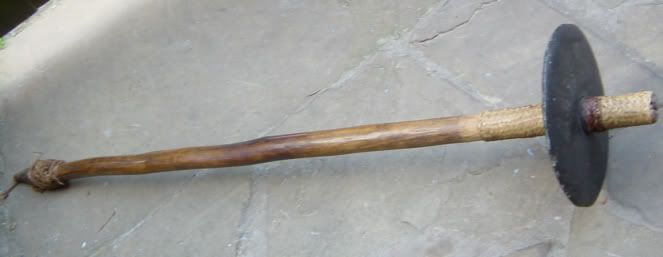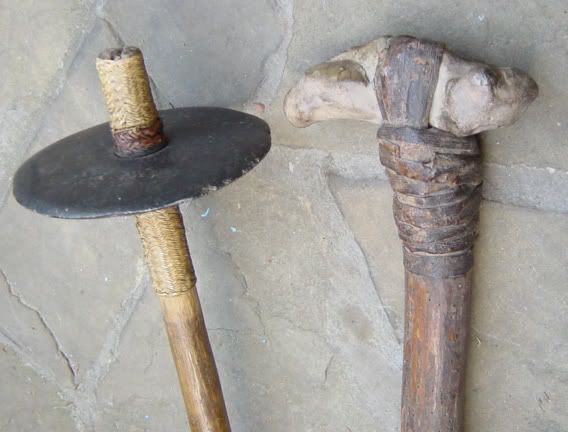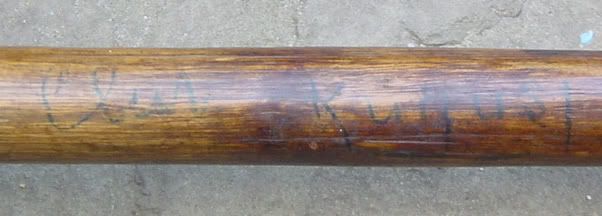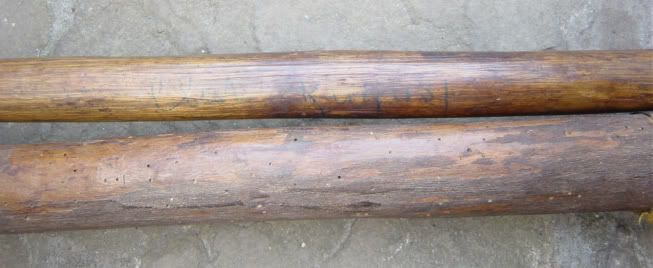
 |
|
|
#1 |
|
Member
Join Date: Dec 2004
Location: What is still UK
Posts: 5,958
|
WILMA
I think is is just great. So much so I had to bring out this old friend to compere wood patina. We know how flint was exported from Aus. This stone looks like granite but I am not an expert. I have found that Yap islanders got there stone money discs from Palau over 290 miles away. The Yap money stones although massive do look like the Gaba-Gaba disc but I would not like to say there is a connection. This club has LLmi ? kumusi writen on it, the Kumusi river Oro province PNG. The other word may be a village or tribe of people. The disc club is also found in the Torres staits Islands. Much further south. I would imagine it was all so found on other islands. I would like to think these pieces were collected before the Kokoda trail. When compered to my African items they do look turn of the 19th early 20th century. For some unknown reason I cannot get the picture manager on this site to work.     
Last edited by Tim Simmons; 2nd April 2009 at 08:11 PM. |
|
|

|
|
|
#2 |
|
Member
Join Date: Dec 2004
Location: What is still UK
Posts: 5,958
|
Basalt.
|
|
|

|
|
|
#3 | |
|
Member
Join Date: Aug 2007
Location: CHRISTCHURCH NEW ZEALAND
Posts: 2,821
|
Quote:
 .....not bollocks?? .....not bollocks??Stu P.S Sorry just couldn't resist that! |
|
|
|

|
|
|
#4 |
|
Member
Join Date: Dec 2004
Posts: 1,247
|
What's this about yer rocks again?
  Seriously, that disk club looks nice south-coast PNG. Still don't know where the other one came from. F |
|
|

|
|
|
#5 |
|
Member
Join Date: Dec 2004
Location: What is still UK
Posts: 5,958
|
I have bumped this up to the surface agian as I have found a new respect for the old stone implements from PNG. I have recently been making things out of limestone, Portland stone to be precise. Now limestone is a soft to medium stone. In these pictures the igneous stone "basalt" club head is shown next to a small limestone bowl I have been carving. I bought a pre-cut block and if I had had a stone cutting disc I may have got this far in a day and a half which is still not finished. I have been cutting the stone with proper stone cutting hardend steel tools. The forming of the stone blades on weapons like this must have taken several days of hard work keeping in mind the desired result, no drifting. I find it astonishing that there is not a lot of value attached to items like this in the weapon collecting world at the moment.
|
|
|

|
|
|
#6 |
|
Member
Join Date: Dec 2004
Posts: 1,247
|
hi Tim,
Nice bowl. Going back to the original post, I'd like to add something I just noticed: the handwriting on the club looks like it says "club Kumusi" not llmi. F |
|
|

|
|
|
#7 |
|
Member
Join Date: Jan 2008
Posts: 1,429
|
Hi Tim
Regarding the club on the right, here is an excerpt from the British Museum 1910 Ethnographical handbook... Regards |
|
|

|
|
|
#8 |
|
Member
Join Date: Jan 2008
Posts: 1,429
|
Sorry, got it this time
|
|
|

|
|
|
#9 |
|
Member
Join Date: Dec 2004
Location: What is still UK
Posts: 5,958
|
Well done Colin.
Can you give any more details about the book. I must say I am very pleased by the information you have provided. There seems very little to dispute. I have always wanted a South American club. We do not see enough native weapons from the Amazon and there abouts. |
|
|

|
|
|
#10 |
|
Member
Join Date: Dec 2004
Location: NC, U.S.A.
Posts: 2,219
|
A few years back when I had a few ethno clubs, Jimmy Manteris told me about a spectacular book on clubs, blow guns, native dress, etc. The book is rather rare and expensive, but i managed to view it through inter-library loan. It's "The Ethnograpic Album of the Pacific Islands" by John Edge-Partington, written in 1895! Kinda like Stone's Glossary in 1905...old, but filled with great info. The pics are all sketched drawings only, usually a turn-off for me, but they were so well detailed and specific, that i really liked this book. It covered Australian clubs, Figian, Soloman, Kingsmill Islands, PNG, etc, etc. It told me that not only was my club from the Solomans, but specifically from the island of Malaita. Highly recommended if you ever pick up a copy...
|
|
|

|
|
|
#11 |
|
Member
Join Date: Jan 2006
Location: Kent
Posts: 2,658
|
Hi Tim,
the illustration of the 'stone headed' club shows that it is mounted to the side of the shaft......yours is mounted on top. So I am not so certain that we can ID yours from the drawing. Regards David |
|
|

|
|
|
#12 |
|
Member
Join Date: Dec 2004
Location: What is still UK
Posts: 5,958
|
Hi David,
For the moment I am very happy to accept this latest information as it is clearly showing the same form of construction and materials the tethering even looks the same. I will try to find more confirming information at the British Museum anthropology resource centre latter in the summer. |
|
|

|
|
|
#13 |
|
Member
Join Date: Jan 2008
Posts: 1,429
|
Hi Tim
Sorry for the delay in replying, as I have been away from London for a few days. The book is "British Museum Handbook to the Ethnographical Collections" published in 1910. Its full of great information, plates and line drawings. There was another edition in the 1920s I think. Well worth having and good for identifying objects. Regards Colin |
|
|

|
 |
| Thread Tools | Search this Thread |
| Display Modes | |
|
|